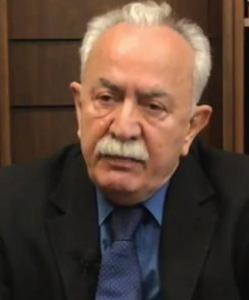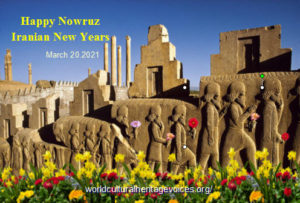 Nowruz is first day of Spring and the beginning of the Iranian year . Nowruz is celebrated on the day of the vernal equinox , on 20th March or the previous / following day depending on where it is celebrated. Nowruz is celebrated and observed by Iranian people as well as several other countries across Asia including Afghanistan, Turkey, Azerbaijan, Georgia, Tajikistan and many more. The new year starts at the moment the Sun crosses the celestial equator and equalizes night and day or exactly when the Earth has completed one cycle around the Sun.
Nowruz is first day of Spring and the beginning of the Iranian year . Nowruz is celebrated on the day of the vernal equinox , on 20th March or the previous / following day depending on where it is celebrated. Nowruz is celebrated and observed by Iranian people as well as several other countries across Asia including Afghanistan, Turkey, Azerbaijan, Georgia, Tajikistan and many more. The new year starts at the moment the Sun crosses the celestial equator and equalizes night and day or exactly when the Earth has completed one cycle around the Sun.
The celebration has its roots in Ancient Iran. Due to its antiquity, there exist various
foundation myths for Nowruz in Iranian mythology. The Shahnameh dates Nowruz as
far back to the reign of Jamshid, who in Zoroastrian texts saved mankind from a killer
winter that was destined to kill every living creature. In the Shahnameh and Iranian
mythology, Jamshid is credited with the foundation of Nowruz. In the Shahnama,
Jamshid constructed a throne studded with gems. He had demons raise him above the
earth into the heavens; there he sat on his throne like the sun shining in the sky. The
world’s creatures gathered in wonder about him and scattered jewels around him, and
called this day the New Day or Now-Ruz. This was the first day of the month of
Farvardin (the first month of the Persian calendar). On Nowruz, families gather together
to observe the rituals and celebrate the beginning of the new year.
In addition, it is believed that originally the celebration was the holiest Zoroastrian
festival, and Nowruz is believed to have been invented by Zoroaster himself, although
there is no clear date of origin. Since the Achaemenid era, the official year has begun
with the New Day when the Sun leaves the zodiac of Pisces and enters the zodiacal sign of Aries, signifying the Spring Equinox.
International Nowruz Day was proclaimed by the United Nations General Assembly, in
its resolution A/RES/64/253 of 2010, at the initiative of several countries that share this
holiday (Afghanistan, Albania, Azerbaijan, the Former Yugoslav Republic of Macedonia,
India, Iran, Kazakhstan, Kyrgyzstan, Tajikistan, Turkey and Turkmenistan
Pasargad Foundation Awards “Personality of the Year 2021”
The Pasargad Heritage Foundation Presents:
The Nowruz Award March 20, 2021.
This press release has been published by the Pasargad Heritage Foundation to the Personalities of the Year for their vision and efforts to preserve the national, cultural, historical, and natural heritage of Iran that also belongs to all humanity.
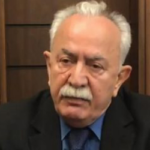 Dr. Mashallah Ajoudani, recipient of the Pasargad Heritage Foundation’s Nowruz Award
Dr. Mashallah Ajoudani, recipient of the Pasargad Heritage Foundation’s Nowruz Award
Dr. Mashallah Ajoudani is a historian, a literary Critic and the founder of the “Library of Iranian Studies” and is this year’s personality of the year in the category of Cultural and Historical Heritage for:
– A lifetime of courageous efforts towards increasing awareness of history and culture of Iran
– Utilizing modern methods of historiography, relying on authenticated documents while working academically without ideological or political prejudice
– Authoring the book “Iranian Constitution,” as the most authoritative book on the history of Iranian constitutionalism
– Prioritizing cultural values in building a modern society for Iran and presenting valuable theories in media writings and speeches
– Creating a new and exceptional critique of the literary works in the history of Iranian criticism in the book, “Guidance, the Blind Owl and Nationalism”
– Establishing an Iranian library in London and striving to keep alive the study of Iranian culture and history.
 Dr. Fred Harrington, recipient of the Pasargad Heritage Foundation’s Nowruz Award
Dr. Fred Harrington, recipient of the Pasargad Heritage Foundation’s Nowruz Award
Dr. Fred Harrington is a biologist, ecologist, environmentalist, and chemical weapons
cleanup specialist and is this year’s personality of the year in the category of Natural Heritage and Environment, for:
– His invaluable role in the development of environmental protections in Iran
– Seven years (between 1970 and 1977) of efforts in different regions of Iran to better understand the natural and environmental conditions of Iran
– Preparation of the first “National Report on Human Environment” presented by the then Iranian government to the first World Environment Conference, Stockholm 1972
– Writing Iran’s environmental plan and program, as a roadmap for the establishment of Iran’s Environmental Agency
– Efforts to introduce local people to environmental and wildlife protection
– Publishing articles and scientific books and creating documentary films about the environment, in simple language, for public education and to inform local communities including villages and indigenous communities of Iran with the methodologies of environmental protection.
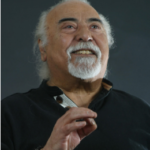 Esfandiar Monfaredzadeh, recipient of the Pasargad Heritage Foundation’s Nowruz Award.
Esfandiar Monfaredzadeh, recipient of the Pasargad Heritage Foundation’s Nowruz Award.
Eefandiar Monfardzadeh is a musician and composer and is this year’s personality of the
year in the category of Cultural Heritage and Performing Arts, for:
– Life time contribution to creating unique modern Iranian music
– Creating a whole new Iranian musical genre, a new style of musical writing for film and songs263
– Innovative initiatives in making film soundtracks for Iranian cinema
– Choosing inspiring and stimulating lyrics in his songs
– Supporting human rights, especially in regards to the release of women and political
prisoners in Iran
– Composing the first music dedicated to “Cyrus Day,” immediately after the proposal of
“Cyrus the Great Day” by the Pasargad Heritage Foundation.
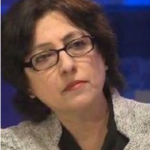 Elahi Boghrat, recipient of the Pasargad Heritage Foundation’s Nowruz Award.
Elahi Boghrat, recipient of the Pasargad Heritage Foundation’s Nowruz Award.
Elahe Boghrat is an author, journalist, editor of the London-based Kayhan newspaper, spokeswoman
for the Phoenix Iran Project, and this year’s personality of the year in the category of cultural heritage
and communication, for:
– Her services as a journalist and editor of a prominent political and news publication outside Iran
– Advocate for Iranian culture, history, and art
– Vocal supporter of human rights in her writings and statements
Dr. Mashallah Ajoudani, recipient of the Pasargad Heritage Foundation’s Nowruz Award.
Dr. Mashallah Ajoudani was born in 1950 in Amol in northern Iran. He spent his elementary and high school years in Amol, and in 1972 was admitted by the Faculty of Literature at the University of Tehran to study Persian language and literature. He later also received a doctorate in Persian language and literature from the University of Tehran. His doctoral dissertation focused on the study of the styles of constitutional poetry.
For seven years, Ajoudani was an official member of the faculty at the University of Isfahan, Iran and an instructor at the Department of Persian Language and Literature in the Faculty of Literature and Humanities, where he taught texts of ancient Iranian literature and contemporary literature.
In January 1987, Ajoudani moved to London with his family and continued his cultural and literary work. Dr. Ajoudani’s first book, titled “The Iranian Constitution and the Background of the Theory of Velayat-e Faqih, a Critique and Study of the History of the Constitution and the Historiography of that Period,” was published in London in 1997. The book, which has also been titled “Iranian Constitution,” has thus far been reprinted twelve times.
His second book titled, “Either Death or Renewal,” is a book on constitutional poetry and literature, published in 2002 in London. This book has been reprinted five times.
His third book, “Guidance, The Blind Owl, and Nationalism, on Literary Criticism, The Blind Owl Critique, and Its Structure” was published in 2006 in London. This book has also been published three times.
Dr. Ajoudani is currently the Director of the Library of Iranian Studies and a member of its Board of Trustees in London. The library was founded by him in 1991.
d songs, most of which were among the most popular songs of the time. He also composed soundtracks for tens of films. His reputation as soundtrack composer greatly helped the popularity and sales of films.
Monfaredzadeh left Iran for the United States in one year after the Islamic Revolution, to protest the persecution of dissidents. He has not returned to Iran since then and during this time he has composed about 20 songs and soundtracks.
Dr. Fred Harrington, recipient of the Pasargad Heritage Foundation’s Nowruz Award
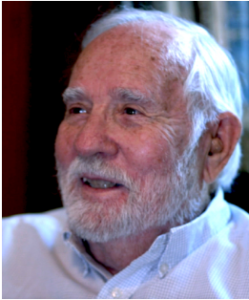 Brief Biography, Fred A. Harrington, Jr
Brief Biography, Fred A. Harrington, Jr
Dr. Fred A. Harrington was born in Colorado, and at the age of 10 the family moved to Albuquerque, New Mexico, where his father worked as a construction engineer. He attended the University of New Mexico in pre-forestry and then transferred to Colorado State University, where he obtained a degree in Wildlife Biology in 1959. After graduation, he was employed as a big-game biologist by New Mexico Game and Fish Department. Three years later, faced with the military draft, he chose to enter the Aviation Cadets program, where after a year of training he became a 2nd Lieutenant with a flight navigator rating.
He served 5 years in Military Airlift Command during the Vietnam War era, attaining the rank of Captain and then returned to Graduate School at Colorado State University where he studied Bighorn Sheep in Rocky Mountain National Park for my PhD.
In 1970 Harrington was interviewed by Eskandar Firouz )head of the Hunting and Fishing Organization), for a position in Iran, where he served for 7 years in a wide range of natural resource activities. Among his chief accomplishments was completion of the National Report on the Environment for the Stockholm Conference and subsequently was asked to prepare a plan for creation of the Iran Department of the Environment. The plan was passed by Parliament in 1972, and he served as head of the Division of the Natural Environment, where he continued to conduct and supervise field activities, prepared a wide range of scientific and popular publications and worked with several film groups to document the activities of the Department.
Harrington returned to the United States in 1977 and worked as Western Regional Land Steward for the Nature Conservancy before setting up his own environmental consulting firm. He was hired by Ebasco Engineering to perform the Ecological Monitoring Program for the cleanup of Rocky Mountain Arsenal, allegedly the most polluted spot on the planet. Harrington was then engaged by the Department of Energy to perform the feasibility studies for cleanup of Rocky Flats Nuclear Facility near Denver. He subsequently served as head of the Ecology Division, monitoring the cleanup. Both Rocky Mountain Arsenal and Rocky Flats Nuclear Facility ultimately became National Wildlife Refuges.
Harrington and his wife then returned to our roots in the Pawnee Grasslands of northeast Colorado where thay restored an historic hotel and ran a “birder’s bed and breakfast” which thay named the Plover Inn.
Esfandiar Monfaredzadeh, recipient of the Pasargad Heritage Foundation’s Nowruz Award.
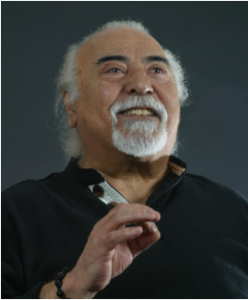 Esfandiar Monfaredzadeh, musician and composer
Esfandiar Monfaredzadeh, musician and composer
Esfandiar Monfardzadeh was born in 1941 in Tehran, Iran. From an early age, he learned playing various instruments, and from the age of thirteen, he played the tambourine, accordion, and dulcimer in school art programs. At fifteen he played with a group in the Children’s morning program of Iran’s national radio. From the age of sixteen, he worked and played instruments in cafes and theaters in Tehran.
Monfardzadeh was nineteen years old when he started composing songs and composed a song for the Radio Iran Youth Orchestra. He went on to compose more than ten songs in the next three years. Along with writing songs, one of Monfardzadeh’s major interests was writing soundtracks, and he regularly checked with Iran’s film studios at the time to pursue any possible opportunity.
In 1967, he started a degree in music at the Faculty of Fine Arts in the field of music, but after about two and a half years, he dropped out of the university program.
It was at the opening ceremony of the same college that he arranged and conducted the music of the “Great Student Orchestra of the University of Tehran” (sixty musicians and fifty choirs) for the opera “Conquest of Babylon” (composed by Reza Narvand). This opera was held in the presence of the King and Queen of Iran.
It was from 1969 onwards that he was commissioned by various studios to write and record soundtracks, arrange lip-syncing songs, compose melodies and perform various songs. It was at that time that composing and arranging the full soundtrack for a movie called “Ghaisar” made him famous.
In 1971, he received the award for best soundtrack for it, and a year later, he received the award for best soundtrack again for composing and arranging the soundtrack of another film called “Reza Motori”. In that film, for the first time, he used “song” for the soundtrack.
While in Iran, he composed more than hundred songs, most of which were among the most popular songs of the time. He also composed soundtracks for tens of films. His reputation as soundtrack composer greatly helped the popularity and sales of films.
Monfaredzadeh left Iran for the United States in one year after the Islamic Revolution, to protest the persecution of dissidents. He has not returned to Iran since then and during this time he has composed about 20 songs and soundtracks.

